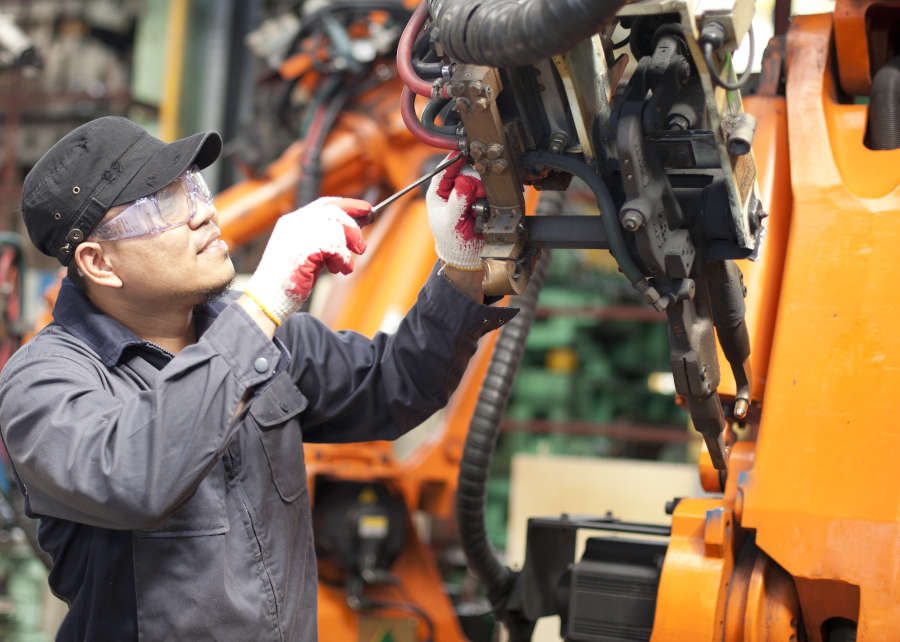7 Factors Responsible for High Employee Turnover in the Trades

Finding the right people for open positions is a challenging task, especially in the trades.
However, hiring the wrong person can have an even more detrimental effect on your team and business than not hiring anyone at all. The wrong person can:
- Decrease employee morale
- Lower employee engagement
- Poison company culture
- Damage client relationships
- Reduce productivity
…and more, ultimately resulting in a loss of revenue for the company (your company).
Once you finally find the right applicant, the cost of hiring them is more than just their salary. You have to factor in the cost of advertising, recruiting, training, etc. Therefore, hiring a new employee is a decision that should be intentional, not reactional.
You want to do everything in your power to retain employees, not frivolously fire and hire.
So, what are the top reasons for employee turnover?
Are there ways to reduce employee turnover?
Where can employers find the right tradesmen for open positions?
In this blog, we’re breaking down seven causes of employee turnover and how to reduce it, along with a solution to your skilled labor hiring needs.
7 Top Reasons for Employee Turnover
The Covid pandemic has led to this time in American history being labeled as “The Great Resignation.” According to NPR, “As pandemic life recedes in the U.S., people are leaving their jobs in search of more money, more flexibility, and more happiness.”
Not to mention, there’s still the great labor shortage in the trades that make it that much harder to find and hire qualified workers.
Normally, people quitting jobs signals a healthy economy that’s booming with employment opportunities. However, the pandemic has made life anything but normal. So, what are the main reasons for employee turnover?
Let’s discuss the reasons for high attrition rates by reviewing employee turnover causes and effects, so your business can succeed in this new normal.
1. No Career Advancement Opportunities
One of the top reasons for employee turnover cited by millennials is the lack of career advancement and professional development opportunities. Gartner advises HR leaders to pay closer attention to employee dissatisfaction rates and offer career development.
Attrition is costly for any company, and the cost is rising. This is especially true for the trades where it’s hard enough to find good workers in the first place.
Career advancement should be followed by a pay raise, which is also one of the factors responsible for high employee turnover. Lateral transfers without compensation make employees feel worse off than they were before, says Brian Kropp, Gartner HR Practice Group Vice President.
2. Poor Company Culture
A toxic corporate culture is one of the primary reasons for turnover in a company. Examples of a toxic company culture include:
- One that doesn’t promote diversity or inclusion
- Is plagued by infighting and drama
- Workers feel disrespected and undervalued
- Unethical behavior is swept under the rug
Championing a positive work culture keeps employees happy, increases engagement, and encourages productivity, which leads to better performance and higher retention rates. Ensure you hire the right managers to uphold this kind of culture because they set the tone for a team.
3. Bad Bosses
Another one of the major causes of employee turnover is bad bosses.
According to a study facilitated by Johnathan Booth, bad bosses are driving away their best employees. For example, consider an employee who’s doing amazing work, showing up to work on time, and outperforming their peers. But, their manager doesn’t seem to recognize their efforts or promote them.
A common form of bosses mistreating subordinates is called “supervisor social undermining.” Without going into too much detail, this is when a manager intentionally tries to hinder an employee’s success, attempting to tarnish their reputation.
As an employer, it’s up to you to ensure that managers are treating employees well and not abusing their power/position.
4. Lack of Recognition
Lack of recognition is another one of the reasons for staff turnover.
Piggybacking on the previous point, when bad bosses are in positions of authority, they won’t congratulate top talent for various reasons. One is that these managers feel threatened by an employee’s high performance, fearing they are replaceable. Employees will only take so much of this poor treatment before finding another job that recognizes their efforts.
Studies show that 79 percent of employees who quit their jobs claim that a lack of appreciation was a major reason for leaving. However, when you recognize employees for their hard work, they feel affirmed and appreciated, encouraging them to keep up the good work.
5. Excessive Workload
Being overworked is not an uncommon employee turnover factor.
Burnout happens when employees are given too many tasks without the resources to succeed in the given timeframe. Employees are on the brink of burnout when they feel a lack of control over their work or their daily stress levels exceeds their ability to manage it.
Unfortunately, for many skilled labor employees being overworked and burned out is becoming the norm. A lack of staff causes current employees to work overtime too frequently. If workers don’t get relief from this kind of stress, it won’t be long before they leave.
6. No Work Flexibility
Another one of the top reasons for employee turnover is lack of flexibility.
Flexibility has become one of the most prized benefits at a person’s place of employment. Unlike other industries, skilled workers can’t experience the flexibility of remote or at-home work. However, flexibility can look like providing employees with a more sustainable or desirable work schedule.
Offering flexible hours or shifts are a necessity these days. If you don’t provide flexibility at work, your company is less attractive to candidates.
7. Being Ignored
Employees want to improve their place of work. The average person spends one-third of their life at work, so the goal is to make it better than simply bearable. When companies ignore the voice of their employees, these hard-working individuals feel devalued and insignificant.
Another way to recognize employees is to ask for their input and value their opinions. The best way to get a read on your company culture, employee satisfaction, managers, etc., is to ask employees for their feedback. Consider surveying your employees every quarter to identify the health of your company.
If employees feel like they’re not heard or that you don’t care about their opinions, they’ll be more likely to go somewhere else.
Overcome Employee Turnover Factors Today
We just listed seven of the top reasons for employee turnover in the trades:
- No career advancement opportunities
- Poor company culture
- Bad bosses
- Lack of recognition
- Excessive workload
- No work flexibility
- Being ignored
However, there’s actually one overarching problem that leads to employer turnover in the trades. Are you wondering, “What is the main reason for employee turnover in trade labor?”
It all boils down to a lack of workers and poor hiring practices.
If you want to reduce your employee turnover rate, you need to hire the right people for the job.
You don’t have to worry about employee turnover factors when you can:
- Hire the best employees
- Hire new employees every time you need them
Although you should consider the factors responsible for high employee turnover above, your company won’t suffer from high attrition rates if you can hire the right workers as soon as a position opens up.
But where can you find qualified skilled workers in the current labor market?
We’re glad you asked.
Skillwork’s Ideal Recruitment Process
At Skillwork, we’ve dedicated ourselves to helping skilled trade employers find and hire qualified workers. Using our proprietary 8-step gating and vetting process and our large pool of experienced candidates, we can find any employer the perfect fit for any job. Whether you’re in need of a short- or long-term hire, we can help you get the workers you need.
Contact us today to talk with one of our Recruiters to learn more about us and our process.


